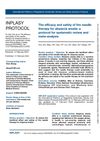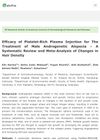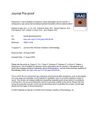 September 2023 in “International Journal of Trichology”
September 2023 in “International Journal of Trichology” Adipose-derived stem cells may help with hair loss, but more research is needed.
May 2023 in “Clinics in Plastic Surgery” Noninvasive treatments like PRP and laser therapy can effectively promote hair growth and reduce hair loss.
 June 2022 in “Frontiers in Medicine”
June 2022 in “Frontiers in Medicine” Acupuncture and moxibustion may help treat hair loss, but more research is needed.

Fire needle therapy's benefits and safety for alopecia areata need more evidence.

Platelet-rich plasma injections effectively increase hair density in men suffering from common hair loss.
 January 2021 in “Journal of The American Academy of Dermatology”
January 2021 in “Journal of The American Academy of Dermatology” The authors concluded that PRP injections were not significantly effective for treating lichen planopilaris and its variants and should not be used as the only treatment.
August 2022 in “Journal of Cosmetic Dermatology” 1% topical cetirizine may help treat hair loss but is less effective than minoxidil.
 June 2012 in “Prescriber”
June 2012 in “Prescriber” Topical minoxidil effectively and safely treats female pattern hair loss, but other treatments need more research.
 December 2023 in “International Journal of Biomedicine”
December 2023 in “International Journal of Biomedicine” Topical finasteride might help with male hair loss with fewer side effects than pills, but more research is needed.
 75 citations,
November 2007 in “Clinical endocrinology”
75 citations,
November 2007 in “Clinical endocrinology” Certain medications including flutamide, spironolactone, and others effectively reduce excessive hair growth in women, especially when combined with lifestyle changes.
 2 citations,
February 2009 in “Journal of Evidence-Based Medicine”
2 citations,
February 2009 in “Journal of Evidence-Based Medicine” No treatment showed significant long-term hair growth benefits for alopecia areata.
 25 citations,
February 2014 in “British journal of dermatology/British journal of dermatology, Supplement”
25 citations,
February 2014 in “British journal of dermatology/British journal of dermatology, Supplement” Intralesional triamcinolone acetonide can regrow hair in alopecia areata but often has temporary effects and side effects.
 27 citations,
May 2019 in “American Journal of Clinical Dermatology”
27 citations,
May 2019 in “American Journal of Clinical Dermatology” Antiandrogen therapy for hidradenitis suppurativa lacks strong evidence and needs more research.
 2 citations,
September 2012 in “PubMed”
2 citations,
September 2012 in “PubMed” Topical minoxidil effectively treats Female Pattern Hair Loss in women of all ages and hormone levels, but evidence for antiandrogens is limited.
March 2021 in “Annals of palliative medicine” Plum-blossom needling with conventional treatments improves hair regrowth in alopecia areata.
5% minoxidil is safe and effective for treating male hair loss.
23 citations,
February 2021 in “Dermatologic therapy” Some treatments like pentoxifylline with topical corticosteroids might work for alopecia areata, but more research is needed to find the best one.
 2 citations,
January 2010
2 citations,
January 2010 Finasteride helps improve hair growth in men with hair loss but may increase the risk of erectile dysfunction.
 September 2023 in “Archives of Dermatological Research”
September 2023 in “Archives of Dermatological Research” Using minoxidil with microneedling increases hair count for hair loss without serious side effects.
 72 citations,
July 2014 in “American journal of clinical dermatology”
72 citations,
July 2014 in “American journal of clinical dermatology” Some treatments, like corticosteroids and sensitizing agents, can help with alopecia areata, but more high-quality research is needed.
67 citations,
March 2018 in “The Journal of Clinical Endocrinology & Metabolism” Oral contraceptives and antiandrogens are effective for treating hirsutism, with antiandrogens being the most effective.
 9 citations,
May 2021 in “Archives of Dermatological Research”
9 citations,
May 2021 in “Archives of Dermatological Research” Home-based skin care devices are generally safe and effective for hair removal, promoting hair growth, treating wrinkles and acne, but results for psoriasis treatment are mixed.
 39 citations,
January 2019 in “Journal of Dermatological Treatment”
39 citations,
January 2019 in “Journal of Dermatological Treatment” Ketoconazole cream is effective for skin conditions like seborrheic dermatitis and may help with hair loss and other skin issues, with generally mild side effects.
 24 citations,
July 2019 in “Cochrane library”
24 citations,
July 2019 in “Cochrane library” Some treatments like methotrexate with prednisone might help juvenile morphea, but more research is needed to confirm.
 21 citations,
September 2017 in “Journal of Obstetrics and Gynaecology Research”
21 citations,
September 2017 in “Journal of Obstetrics and Gynaecology Research” Chromium supplements don't improve insulin, hormone levels, or cholesterol in women with PCOS but raise testosterone levels.
 7 citations,
April 2023 in “Frontiers in immunology”
7 citations,
April 2023 in “Frontiers in immunology” Oral baricitinib and ruxolitinib are effective and safe for treating alopecia areata.
 September 2023 in “Medical & Clinical Case Reports Journal”
September 2023 in “Medical & Clinical Case Reports Journal” Platelet-Rich Plasma (PRP) may increase hair density and thickness in Androgenetic Alopecia, but it's not significantly better than a placebo.
Finasteride effectively reduces and reverses hair loss in men.
 164 citations,
April 2008 in “Cochrane library”
164 citations,
April 2008 in “Cochrane library” Current treatments for alopecia show no significant long-term benefits.
58 citations,
November 2018 in “Cochrane library” Oral isotretinoin may slightly improve acne but increases the risk of side effects like dry lips and skin; more research is needed to understand its full risks and benefits.






















